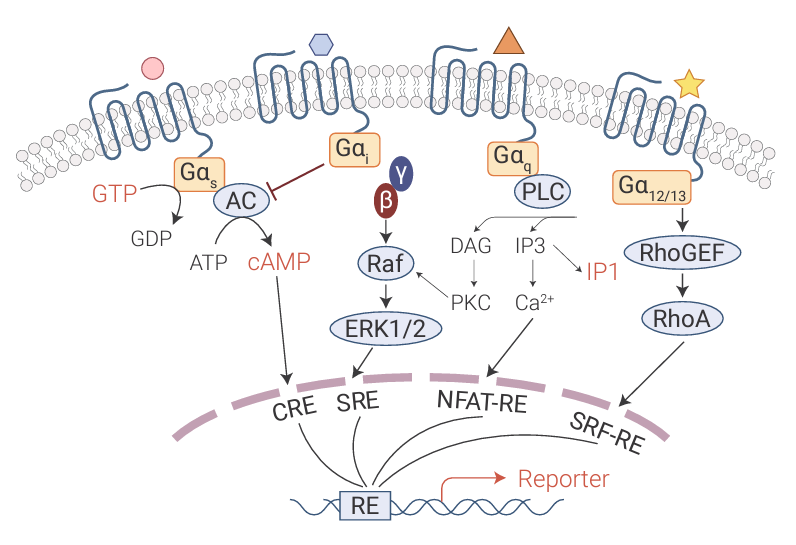GPCR assays have emerged as indispensable tools in the pursuit of effective drug discovery and development. G protein-coupled receptors (GPCRs) are a diverse class of membrane proteins, comprising over 800 receptor types, and they impact almost every physiological process in the human body. From mediating sensory responses to regulating immune system functions, these receptors play a critical role in maintaining homeostasis. They are also therapeutic targets for numerous diseases, highlighting the importance of GPCR signaling assays in modern pharmacology. This blog will discuss the role of GPCR assay kits in understanding receptor-ligand interactions, how assay sensitivity impacts drug validation outcomes, and the value of choosing the right GPCR assay kit supplier for seamless integration into preclinical testing frameworks.
Table of contents:
Understanding Receptor-Ligand Interactions via GPCR Assays
How Assay Sensitivity Impacts Validation Outcomes
GPCR Assay Kit Integration in Preclinical Testing
Receptor-ligand interaction studies form the backbone of GPCR drug discovery efforts. GPCR signaling assays provide intricate details about how a specific ligand binds to and activates or inhibits a receptor. Technologies such as radioligand binding assays and Tag-Lite binding assays offer unparalleled sensitivity for quantifying these molecular interactions. For example, radioligand binding assays deliver highly precise measurements of ligand-receptor dynamics, which is crucial for identifying promising therapeutic compounds. Similarly, novel techniques like the Tag-Lite assay use competitive binding formats to quantify binding affinities with extraordinary accuracy, providing critical insights into a ligand’s potential effectiveness. GPCR assays serve not only to evaluate binding but also to assess downstream effects, such as with cAMP assays and calcium flux assays, which illustrate the pathways impacted by ligand-receptor interaction. These methodologies have fundamentally shaped the GPCR drug discovery landscape by revealing detailed mechanisms that can be exploited for therapeutic gains.

Assay sensitivity is paramount in determining the reliability and accuracy of GPCR assays, directly influencing the efficiency and outcomes of drug validation. High-sensitivity platforms like Biacore’s SPR-based binding assays detect subtle kinetic variations that help evaluate a drug candidate's selectivity and potency. For instance, detecting low-affinity bindings between potential drugs and off-target GPCRs can prevent costly downstream failures by eliminating unsuitable compounds early in preclinical stages. Additionally, signal readouts from functional assays such as β-arrestin recruitment and GTPγS binding assays offer refined data about GPCR activation and signaling cascades. Notably, β-arrestin assays are particularly valuable when exploring biased agonism, an emerging concept in pharmacology that has led to the development of targeted therapies with reduced side effects. With this level of precision, researchers are better equipped to produce actionable data during GPCR drug discovery, significantly enhancing the odds of successful target validation.
The integration of GPCR assay kits in preclinical testing has revolutionized drug development protocols by providing ready-to-use, reliable testing solutions. GPCR assay kits cover over 170 validated receptor targets across multiple species, streamlining the drug testing process for pharmaceutical companies and CROs. These kits are designed to be user-friendly, enabling rapid deployment in functional and binding assays. Popular assays included in commercially available kits, such as calcium flux assays via the FLIPR system, measure real-time changes in intracellular calcium levels, an important indicator of GPCR activation. Another example is the Reporter Gene Assay, which assesses activation through pathways linked to luciferase-based reporter genes, offering versatility for efficacy testing. Precision tools like these not only reduce turnaround times to as little as 1-2 weeks but also allow for customizable options in dose-response experiments, further supporting a diverse range of research needs.
GPCR assay kits play a pivotal role in advancing drug discovery by providing reliable, efficient, and customizable tools for a variety of research applications. Their ability to streamline workflows, reduce development risks, and enhance the precision of experimental results makes them indispensable in pharmaceutical research. By empowering scientists with high-throughput capabilities and actionable data insights, these assay kits contribute significantly to the development of safer and more effective therapeutics, shaping the future of modern medicine.
2026-02-04
2026-02-04
2026-02-04
2026-02-04
We value your inquiries and are here to provide you with tailored solutions for your drug discovery and development needs. Whether you have questions, require more information, or are interested in discussing potential collaborations, our team of experts is just a message away.
Feel free to reach out to us.